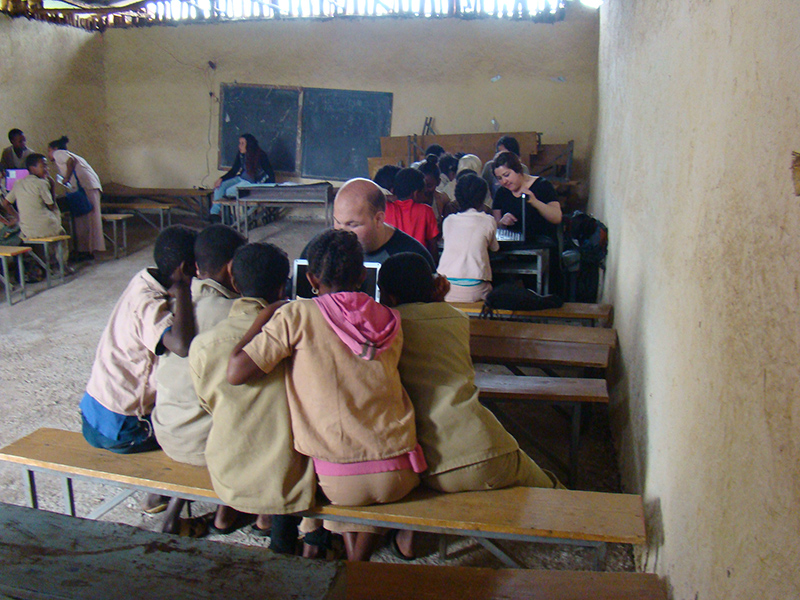There’s growing demand among young Jews to become more active global citizens, to bring the Jewish value of “repairing the world” to life, says Danny Richmond, director of community engagement at Ve’ahavta.
Fittingly, the central questions underpinning last month’s two-week service trip to Gondar, Ethiopia, for post-secondary students and recent graduates, run by Ve’ahavta and several partners, were what does it mean to be a Jew in a globalized world and is there a particular way to be a Jewish global citizen?
The 20 participants who travelled to Ethiopia May 3 to 16 were asked to consider these questions as they embarked on a trip that included providing computer skills training at local schools, painting murals in the pediatric outpatient clinic at Gondar’s new hospital, learning about Ethiopian culture and the country’s Jewish history, and spending Shabbat with Jews in Gondar, whose population is estimated to be from 3,000 to 14,000, Richmond said.
READ: LET’S REMEMBER ISRAEL’S REFUGEES FROM SUDAN AND ERITREA
Ve’ahavta co-ordinated the trip in partnership with Beth Tzedec Congregation, Shaarei Shomayim Congregation, Hillel Ontario, and the Jewish Learning Initiative on Campus.
All partners contributed to subsidizing the trip, but each participant also had to pay a fee and raise a minimum of $300, which will to go toward poverty reduction efforts in Toronto and Ethiopia.
The fundraising requirement was meant to ensure participants were committed to social justice, but also to counteract any sense they were simply “showing up [in Ethiopia] and leaving,” Richmond said, adding, “We wanted to make sure the work we were doing fit into a longer-term strategy [for development in Gondar].”
The trip’s on-the-ground partner was Project TEN, an initiative of the Jewish Agency for Israel, which has an ongoing presence in Gondar and helped direct, based on consultation with the local community, where the group could best target its volunteer efforts.
Key issues in Gondar the group was exposed to included access to health care, access to computers, income disparity and poverty, Richmond said.
He, along with Rabbi Noah Cheses of Shaarei Shomayim and Samantha April of Hillel Ontario, staffed the trip.
Participants came from a wide range of educational, professional and religious backgrounds within Judaism, Richmond said, stressing the diversity was “a really healthy part of the trip.”
On Shabbat, the group met members of Gondar’s Jewish community and sang Hebrew songs, something Richmond said was “a really beautiful sight to see.”
They had Shabbat services with the community at the synagogue in Gondar, and Rabbi Cheses read from the Torah.
“I found the Jewish community of Gondar to be very friendly, warm and spirited… They have so many of the same prayers [as we do], with some Amharic [a Semitic language spoken in Ethiopia] prayers as well. They pray with such spirit and emotion, which was really beautiful to see,” said Samara Bernstein-Hendry, 23, one of the attendees, who graduated from the University of Western Ontario and works as program co-ordinator at Toronto’s Jewish Urban Meeting Place (JUMP).
In addition to doing volunteer work with a lasting impact, Richmond said, one of the trip’s key goals was to emphasize the importance of “creating ambassadors and active Jewish, global citizens who will, through their networks, be able to catalyze new activities on these issues, whether through their university campuses, shuls… or other spheres of influence.”
READ: WHEN IT COMES TO FGM, NO COMPROMISE ON WOMEN’S RIGHTS
The group spent time throughout the trip reflecting on their experiences, discussing concepts such as the Jewish notion of justice and what sustainable development looks like. They’ll also meet for a Shabbaton in the coming months to talk about how they can apply what they learned in Gondar to future initiatives.
Bernstein-Hendry said she came away with new insight into Gondar’s culture and a sense of gratitude that she was able to learn from and contribute to the lives of people in the Jewish community there and beyond.
“My experiences in Ethiopia reminded me that as a Jewish person living in Canada, I am not only part of the Jewish community but of a greater society, and both of these roles come with different responsibilities…I believe I have the responsibility to help and support my fellow Jews, but there are also many people in Canada and outside of it who aren’t Jewish that also need support,” she said.
